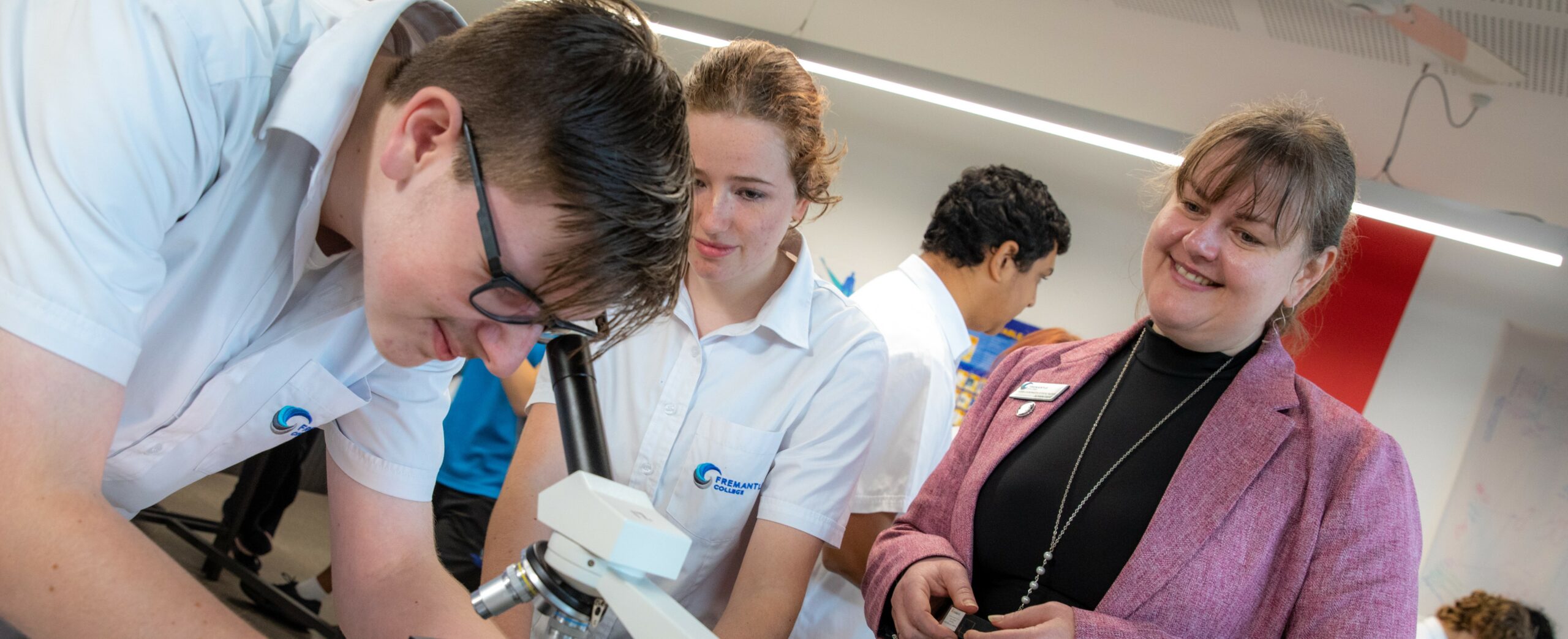The Fremantle College Science Department believes it is vital that all students receive a solid grounding in Science. The college offers a comprehensive and diverse program designed to stimulate our students with a sense of curiosity, knowledge and enthusiasm for this subject that will last the rest of their lives. It is delivered in well-equipped, modern, purpose-built laboratories by a staff that is enthusiastic, well qualified and dedicated to offering a quality science program to students.
Years 7 to 10
The Science curriculum for Years 7 to 10 has three interrelated strands: Science Understanding, Science as Human Endeavour and Science Inquiry Skills, to help students develop a scientific view of the world. Under the Science Understanding strand, students explore a variety of content within the sub-strands of Biological Sciences, Chemical Sciences, Earth and Space Sciences and Physical Sciences.
The Science curriculum provides opportunities for students to develop an understanding of relevant concepts and processes, the skills used to develop scientific knowledge, its contribution to our culture and society and its applications in our lives. Our first aim is to develop confidence, basic scientific skills and knowledge, ways of learning and an enjoyment of the subject.
All students undertake a common, integrated course, which incorporates developing knowledge and scientific skills and applying this understanding in practical activities and experiments. Selected high performing students will be offered a place in the Science Academic Excellence Academy class in Years 7 to 10, which furthers creative and critical thinking skills preparing students for further study in and the rigours of a constantly evolving world.
In addition to the core Science, students in Years 9 and 10 can opt to study Forensic Science and, upon successfully completing a selection process, Marine Science.
Forensic Science students are involved in investigating and integrating their knowledge in the examination, analysis, interpretation, reporting, and testimonial support of physical evidence including fingerprint analysis and casting of prints. Students also study emerging disciplines, such as digital evidence and spectroscopy analysis.
Marine Science students, as part of our Specialist Marine Studies Program, will gain a greater understanding of the complex issues that impact our oceans including global climate change, fisheries and food production and maritime pollution, and take steps to support the conversation and management of the marine environment. Students engage in specific marine based program and curriculum, such as Marine Vertebrates and Invertebrate Dissections, Bathymetric profile of Earth’s oceans and Project based activities with a strong linkage to marine and maritime related industries.
Year 11 to 12
In Year 11, students select ATAR or General courses. ATAR courses include Human Biology, Chemistry, Physics and Marine and Maritime Studies. General courses include Integrated Science, Psychology, Marine and Maritime Studies. Completion of Unit 1 and 2 in Year 11 lead to Units 3 and 4 in Year 12. Courses are organised to meet WACE requirements for students seeking an ATAR for University entrance and for those completing General WACE courses as preparation for further study at TAFE or for the workplace.
Human Biology is the scientific study of humans as individuals and as populations. It encompasses the study of the structure and function of the body, the human life cycle, the biological and cultural evolution of humans, human ecology and biotechnology. Human Biological Science is valuable preparation for tertiary courses such as medicine, dentistry, occupational therapy, physiotherapy, speech and hearing science, nursing, human biology, human physical performance, human movement and recreation studies or education.
In Chemistry, students gain knowledge and understanding of the principles of physical and chemical change and an understanding of the world around them on an atomic level. There is a balance between theory and practice to encourage a clear understanding of properties, reactions and processes. For students heading to university, Chemistry is a recommended course for students planning to study medicine, biochemistry, pharmacology, chemical engineering, food science, geology or nanotechnology.
Physics is a fundamental branch of science concerned with the study of matter and energy and their interactions. It is essentially an experimental discipline and its methods rely on this to support theories and observations. This course is useful for students interested in heading to university to study astronomy, engineering, nanotechnology, biophysics or radiotherapy.
The General Integrated Science course encourages students to be questioning, reflective and critical thinkers about scientific issues. It incorporates aspects of biology, chemistry, geology and physics and seeks to expose students to a wide range of scientific knowledge giving them skills to solve real-world problems. Students have the opportunity to pursue a wide range of activities including environmental degradation and forensic science in Year 11 and Horticulture in Australia, Permaculture, Cosmetics, Biochemical and Space engineering in Year 12.
The General Psychology course introduces students to psychological knowledge through learning about well-known psychological models and theories, and the methods used to conduct scientific investigations in the discipline of psychology. Acquiring this foundation of scientific method and critical thinking is a valuable skill which students can apply throughout their study, work and everyday lives.

